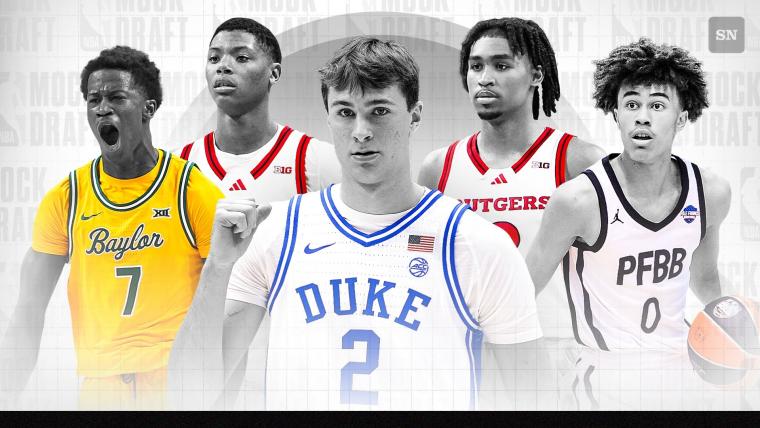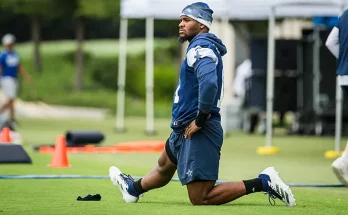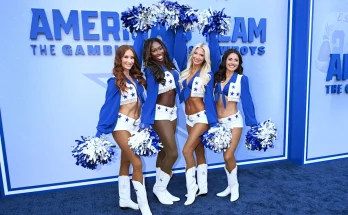In a bold statement that’s already shaking up the basketball world, Rutgers head coach Steve Pikiell has stoked the fires of NBA Draft debate by suggesting that Ace Bailey—not consensus No. 1 prospect Cooper Flagg—might ultimately be the better choice in the 2025 NBA Draft. It’s a massive claim, one that not only elevates the perception of Bailey but also reflects the rapidly rising stature of Rutgers basketball as a legitimate pipeline to the professional ranks.
Pikiell, known for his grounded approach and focus on development, isn’t one to traffic in hyperbole. That’s precisely why his praise of Bailey carries real weight. “Ace Bailey has everything you want in a future NBA star,” Pikiell said. “Length, athleticism, shot-making, unselfishness, and he’s just scratching the surface. People talk about Flagg—and rightfully so—but Ace has a real case to be the No. 1 pick next year.”
This assertion is stunning on multiple levels. First, it challenges the near-unanimous assumption that Duke’s Cooper Flagg—a transcendent talent drawing comparisons to Kevin Durant, Larry Bird, and even LeBron James—would be the top overall pick in the 2025 NBA Draft. Second, it serves as a glowing endorsement of not just Bailey but of the entire Rutgers basketball program. Third, it signals a seismic shift in how we evaluate elite basketball talent.
Bailey, a 6-foot-10 forward with guard-like skills, committed to Rutgers alongside top guard prospect Dylan Harper, forming what is arguably the most hyped recruiting duo in program history. The pairing instantly transformed the Scarlet Knights into one of the most intriguing teams in the country, and early workouts have only reinforced the belief that both players are destined for stardom.
But what separates Bailey, in Pikiell’s eyes, from the rest of this loaded draft class? For starters, it’s his combination of size, versatility, and feel for the game. “You watch him for five minutes and it just pops,” Pikiell said. “He’s got this rare blend of smoothness and explosion. He can shoot it from NBA range, handle in the open court, defend multiple positions, and he’s learning how to take over games without forcing it. That’s special.”
The statistics back it up. In high school, Bailey routinely put up eye-popping numbers—25 points, 11 rebounds, 5 assists, 3 blocks. More impressively, he did it while displaying elite efficiency and defensive intensity. He was never just a scorer—he was a playmaker and an anchor. Already, NBA scouts have been spotted flocking to Piscataway in unprecedented numbers. Rutgers practices have become showcases, and no player is drawing more eyes than Bailey.
One NBA scout, speaking anonymously, offered the following insight: “If the draft was today, I think most teams would still take Flagg. But we’re watching Ace Bailey a lot more closely now. His skill level at his size is special, and you can’t ignore how he’s adapted so quickly to the college game. He doesn’t take bad shots. He sees the floor. He’s unselfish but deadly. That’s a rare combo.”
To understand how dramatic Pikiell’s statement really is, consider the mythology already building around Cooper Flagg. The Duke forward has been labeled a generational prospect since middle school, and he did nothing to temper those expectations in his freshman season with the Blue Devils. Known for his court vision, rim protection, and ability to impact games without dominating the ball, Flagg is, by most accounts, the prototype for the modern NBA franchise player.
But Pikiell isn’t dismissing Flagg’s greatness—he’s simply pushing the conversation forward. “Look, Cooper Flagg is incredible. He deserves every bit of the hype,” he said. “But when you’re talking about building an NBA team—looking at fit, upside, mentality—Ace checks every box. He’s got more bounce than people realize, and his work ethic is through the roof. He’s not looking to be famous—he’s looking to be great.”
That last point might be Bailey’s greatest selling point. In an age where NIL deals, social media influence, and personal branding dominate the headlines, Bailey is carving out a reputation as a quiet killer. He doesn’t seek attention. He doesn’t posture. He just performs.
“He’s all about the work,” Harper said about his teammate. “We push each other every day, and I’ve never seen someone that locked in. People talk about him like he’s flashy—and yeah, he can throw down some crazy dunks—but it’s the stuff you don’t see that makes him different. He studies film. He asks questions. He wants to win.”
And win they might. Rutgers has never had this level of talent on its roster—certainly not in the same season. Harper, the son of former NBA champion Ron Harper, is a five-star point guard with elite court vision and the ability to control the tempo of a game. Bailey gives him the perfect target: a high-flying wing who can stretch the floor, finish at the rim, and create mismatches all over the court.
Together, they’re not just trying to win games—they’re trying to change perceptions. And so far, it’s working. National media attention has already tripled for Rutgers. Ticket sales are booming. The RAC (Jersey Mike’s Arena) is expected to be sold out for every home game. And NBA teams are setting up scouting operations in New Jersey.
Still, the shadow of Flagg looms large. The Duke superstar is coming off a stellar season that included a deep NCAA Tournament run, multiple National Player of the Week honors, and highlight after highlight. His basketball IQ is elite. His instincts are off the charts. He’s the kind of player who makes a good team great—and a great team unstoppable.
But the NBA is a league of projections. It’s not just about who you are now—it’s about who you’ll be three to five years down the line. That’s where Bailey may have a real argument. His ceiling, according to some scouts, may be even higher than Flagg’s.
“He’s got more physical tools,” one scout said. “Cooper’s a better passer and has a deeper understanding of the game right now, but Bailey’s upside is insane. You just don’t see many 6-10 guys who move like him. If his motor stays high and he adds strength, you’re looking at a perennial All-Star.”
Of course, the road to No. 1 is never straightforward. Injuries, team fit, college performance, and pre-draft workouts will all play a role. But Pikiell’s comments have already added fuel to an ongoing debate—and brought Rutgers basketball to the forefront of that conversation.
“You want people to believe in your guys,” Pikiell said. “And I believe in Ace Bailey. I’ve seen what he can do. I’ve seen how he leads. And I think when it’s all said and done, people are going to look back and say: That kid from Rutgers? He was the best player in that draft.”
Time will tell whether Pikiell’s belief is prophetic or premature. But in a draft class as loaded as 2025, one thing is certain: Ace Bailey isn’t just in the conversation—he might be rewriting it.



